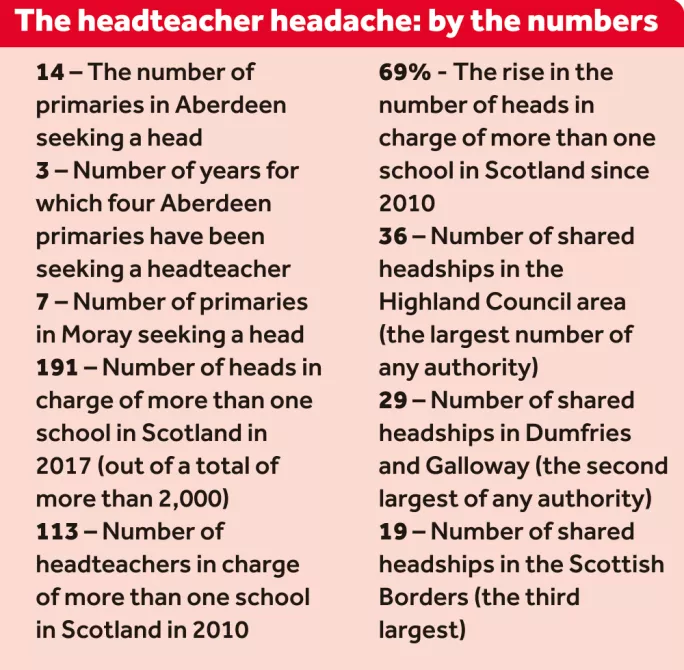Schools still searching for a head after three years

One Scottish council has been unable to recruit a permanent headteacher for more than a quarter of its primary schools, with some schools searching for a headteacher for longer than three years, Tes Scotland can reveal
In response to a freedom of information request, Aberdeen City Council has revealed that 14 of its 49 primary schools are seeking headteachers, with the longest running vacancy at Culter School - which has a roll of over 300 pupils - where the council has been trying to recruit a headteacher since June 2014.
Three further Aberdeen primary schools - Kaimhill School, Kittybrewster School and Mile-End School - have been seeking headteachers since August 2014.
Aberdeen City Council said its headteacher shortage had come as a direct result of the teacher shortage that it had been grappling with for several years, and that was being felt across Scotland. “If there is a teacher shortage, you inevitably have shortages in all layers throughout the system,” Gayle Gorman, director of education and children’s services, said.
The council is now calling on the government to take action to make teaching a more attractive career. The convener of Aberdeen’s education and children’s services committee, John Wheeler, told Tes Scotland that it was time for the government to offer financial incentives to make studying to become a teacher more attractive - especially for career-changers. “This is not just a local authority issue; government needs to step up to the plate,” he said.
Sharing leadership
The Aberdeen figures came to light as part of a Tes Scotland investigation into headteacher recruitment across the country.
The research also shines a light on a sharp rise in shared headships or executive headships, which involve one headteacher being placed in charge of two or more schools. Usually shared headships are introduced to improve recruitment and retention for small rural schools. Grouping together small rural schools can allow for more attractive headteacher salaries and mean that headteachers can dedicate their time to leading the schools, instead of also being in the classroom.
Back in 2010, Tes Scotland revealed that 17 councils had introduced shared headships; today 23 of Scotland’s 32 councils use these arrangements.

On the Isle of Arran one head has been in charge of six of the island’s seven primary schools since August, and Highland Council is looking at placing one head in charge of clusters of schools, sometimes involving a secondary and associated primaries.
Meanwhile, two authorities - Glasgow and South Ayrshire - are piloting shared headship in secondary. However, secondary headteachers’ organisation School Leaders Scotland is warning that such arrangements should be temporary, arguing that a school is best served by a dedicated headteacher (see box, right).
Overall, across Scotland, 190 headteachers - out of just over 2,000 nationwide - were in charge of more than one school, a rise of over 50 per cent compared with 2010.
The Tes Scotland findings have prompted opposition politicians and primary headteachers’ union AHDS to warn that problems with primary head recruitment could be further exacerbated by the SNP’s governance review, which will mean more responsibility for school leaders. While secondary heads have, by and large, welcomed the prospect of more power, primary leaders have been clear they believe adequate resourcing is the bigger issue.
Scottish Labour education spokesman Iain Gray said the governance review would increase headteachers’ responsibilities “with no promise that salaries will be increased commensurately”.
He warned that instead of addressing headteacher recruitment difficulties, education secretary John Swinney was “about to make this worse”.
Meanwhile, Greg Dempster, general secretary of AHDS, said the two barriers to headteacher recruitment were low pay and the experiences of existing school leaders. Heads were “covering lots of classes and administration” before they could “focus any effort on school improvement”, he said.
“This really needs to be addressed - particularly as the governance review looks to be extending the expectations placed on headteachers,” he added.
Councils also acknowledge that seeing heads grapple with the teacher shortage is putting potential candidates off promotion. Ms Gorman said the high cost of living in Aberdeen had exacerbated teacher shortages - and therefore headteacher shortages - but deputes seeing headteachers doing “all the jobs a wonderful headteacher has to do, as well as teaching for a large proportion of the week” was also making the role unattractive.
Commenting on the Tes Scotland findings, Conservative education spokeswoman Liz Smith said: “This is further evidence, if any was needed, that teacher shortages are affecting the highest level of the profession just as much as classroom teachers.”
A Scottish government spokeswoman said its deal with local authorities to maintain pupil-teacher ratios had halted a period of steady decline in teacher recruitment and resulted in 253 more teachers last year - the first substantial increase since 2007.
She added that the government recognised the difficulties in recruiting headteachers in some parts of the country and was investing £525,000 this year to support 175 participants on the new Into Headship qualification for aspiring headteachers.
You need a Tes subscription to read this article
Subscribe now to read this article and get other subscriber-only content:
- Unlimited access to all Tes magazine content
- Exclusive subscriber-only stories
- Award-winning email newsletters
Already a subscriber? Log in
You need a subscription to read this article
Subscribe now to read this article and get other subscriber-only content, including:
- Unlimited access to all Tes magazine content
- Exclusive subscriber-only stories
- Award-winning email newsletters